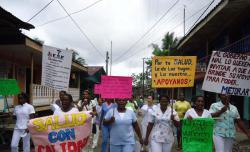 Introduction by Charo Mina Rojas: Dear colleagues and comrades, this is a letter of invitation written by one of the most prominent activist of the Afro-descendant movement in Colombia and founder member of the Black Communities’ Process in Colombia. The Afro-descendant National Congress is an autonomous space of collective construction and dialogue with the Colombian government proposed to halt the hasty track of legislation that has characterized the government of President Juan Manuel Santos and ensure that bills to reform the mining code, environmental corporations, and land and rural development are subject to free, prior and informed consent, through a full participatory process. Since the government decided to break the agreements reached in a meeting on January 11 and 12, PCN is committed to make the Congress happening. For this we need your support and your presence to witness Afro-descendant communities’ struggle in defense of our collective rights.
Introduction by Charo Mina Rojas: Dear colleagues and comrades, this is a letter of invitation written by one of the most prominent activist of the Afro-descendant movement in Colombia and founder member of the Black Communities’ Process in Colombia. The Afro-descendant National Congress is an autonomous space of collective construction and dialogue with the Colombian government proposed to halt the hasty track of legislation that has characterized the government of President Juan Manuel Santos and ensure that bills to reform the mining code, environmental corporations, and land and rural development are subject to free, prior and informed consent, through a full participatory process. Since the government decided to break the agreements reached in a meeting on January 11 and 12, PCN is committed to make the Congress happening. For this we need your support and your presence to witness Afro-descendant communities’ struggle in defense of our collective rights.
The Congress Goes
From, Carlos Rosero, militant of PCN
I arrived at the Black movement by chance, driven by circumstances, my own searches, and the motivation of working with youth in especially difficult circumstances. From the beginning, we understood that racism and racial discrimination constitute especially difficult circumstances that have shaped our lives as Afro-descendents for many generations, the effects and consequences of which, as were recognized in 2001 by the 3rd Global Conference Against Racism, have been maintained over time.
As an activist of The Black Communities’ Process in Colombia – PCN –, we are firmly committed to the realization of the National Congress of Community Councils and Organizations as the possibility of resolving the issue of dialogue with the Government, to establish the appropriate protocol in order to exercise the Right to Prior, Free, and Informed Consent, and to advance the regulations of Chapters 4, 5, 6, and 7 of the Law 70 of 1993, a task that has been postponed for nearly 20 years due to lack of political will in the national government, and because for some of our community representatives, the rights agenda for our people was not profitable, and therefore, has not advanced substantially over the years. In addition, we position ourselves against the lack of transparency, quick inquiries, and decisions made behind our backs.
There was an agreement with the government, developed as of the 10th and 11th of January 2013, in order to learn together and drive forward an agenda that also included prior consultation of bills to reform the mining code, environmental corporations, and land and rural development laws. For nearly 2 months, the certainty that we could learn together and help to resolve the problems in this country and in our communities encouraged the efforts of many activists of various expressions of the Afro-Colombian social movement. The Government chose independently, as was communicated on March 11th 2013, to make wrong decisions and repeat paths already explored while expressing, making distinction between what is urgent (as the government) and the important (the community), that they were committed to Congress and maintained the same resource offer. In light of this, all we can do is be alert and prepare ourselves to defend our right to participation, to prior, free, and informed consultation, and the right to development in the context of our cultural aspirations. He who has been bitten by a snake, fears the earthworm, therefore, we as PCN demand guaranteed tracking and oversight for these ‘consultations’ and all activities that move forward within this context. The right to prior, free, and informed consultations is at risk and the least we can do is ensure that the principles and standards set by the Constitutional Court and the Convention 169 of the ILO do not continue in degradation.
As PCN, we believe in and defend the rights of all Afro-descendents in Colombia. It is the mandate of the First National Assembly of Black Communities of Tumaco in 1992. From this mandate, we undertake and invite all community councils, communities of ancestral lands, Afro-Colombians in towns and in displacement, to take on this challenge as their own, as part of the path to freedom that was handed down to us by our elders.
This effort also requires the support, solidarity, and accompaniment of everyone inside and outside of the country who are committed to the struggle against racism and for social justice.
The Congress is a necessary step in the fight for our dignity and autonomy as a people. The Afro-descendant Congress Goes.
AfroColombia, March 2013



